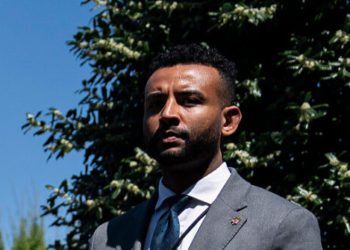Stuart Burrows, a Welsh lyric tenor prized by conductors on both sides of the Atlantic in the 1970s and ’80s for his agile singing in Mozart, becoming a mainstay at the Metropolitan Opera and at Covent Garden in London, died on Sunday in Cardiff, Wales. He was 92.
His death, in a hospice facility, was confirmed by his son, Mark.
Mr. Burrows was a coal miner’s son who was schooled in the chapels of Cilfynydd, the village where he was born. His clear voice and attention to detail would make him an ideal Ottavio in “Don Giovanni” and Tamino in “The Magic Flute.”
His control was effortless throughout the full tenor range, his tone rich and unforced, as in his role as Lensky in Tchaikovsky’s “Eugene Onegin.” In Georg Solit’s 1974 recording of that opera, Mr. Burrows’s voice was “most beautiful and sensitive,” the critic John Warrack wrote in a review in the magazine Gramophone.
Mr. Burrows nearly opted for a professional rugby career as a young man in the early 1950s — he turned down a contract with the club in Leeds at the last minute — but he knew he had a gift that he could not ignore, though his career wouldn’t blossom for another decade.
“I knew I could sing,” he told the BBC in 1972. Yet, he added, “I never had ambition to be a singer.” Singing was merely part of the landscape in bardic Wales; the renowned baritone Geraint Evans was born in the same village — and even on the same street — as Mr. Burrows.
He had settled happily into a role as a schoolteacher in nearby Bargoed, teaching woodworking and music, “a job which he enjoyed immensely,” Roger Wimbush wrote in a biographical sketch in Gramophone in 1971. But then Mr. Burrows sang “Il Mio Tesoro” from “Don Giovanni,” in Welsh, in a singing competition in 1959 at the age-old national Eisteddfod festival, and won.
By 1963, he was singing with the Welsh National Opera while still teaching. A broadcast of Mr. Burrows as Rodolfo in “La Bohème” changed everything.
As he explained to the BBC: “Somehow or other, Stravinsky got to hear of this, and asked me to sing, at Athens, the role of Oedipus Rex” in the 1966 performance of Stravinsky’s opera of the same name. His international career was launched.
He received a call from Covent Garden the next year; Mr. Solti wanted his voice as the First Prisoner in Beethoven’s “Fidelio.”
Four years later, in April 1971, Mr. Burrows made his Metropolitan Opera debut in “Don Giovanni” as Don Ottavio. The reception was rapturous.
By the time he reached the aria “Il Mio Tesoro” — what the critic Donal Henahan of The New York Times called the opera’s “classic test of the lyric tenor” — Mr. Burrows “had already established himself as an artist any opera house would be happy to have on hand.”
This performance, Mr. Henahan wrote, “settled any lingering doubts.”
“The aria was phrased with musicianly grace,” he added, “and its famous one‐breath endurance test was met without hint of strangulation. Add to his musical virtues the sensible stage deportment of Mr. Burrows (he did not try to shirk the fact that Ottavio is one of the most ineffectual rabbit brains in all of opera), and you have an important Metropolitan debut.”
Mr. Burrows would sing 78 performances with the company. In “The Magic Flute” in 1976, he was “an elegant Tamino who sang the role in style and with a free, easy, virile sound,” Harriet Johnson wrote in The New York Post. He finished his Met career in 1982 as Belmonte in Mozart’s “Abduction From the Seraglio” — “as dulcet as ever,” Mr. Henahan wrote.
At Covent Garden, which became the Royal Opera House, Mr. Burrows sang Fenton in Verdi’s “Falstaff,” Edmondo in Puccini’s “Manon Lescaut,” the title role in Gounod’s “Faust” and Titus in Mozart’s “La Clemenza di Tito,” his last role there, in April 1989.
“Burrows has a sweet, truly placed lyric tenor, capable of great flexibility and smoothness,” the critic Alan Blyth wrote in The New Grove Dictionary of Music and Musicians.
Mr. Burrows made dozens of well-received recordings. Ina 1973 recording of “Don Giovanni,” with Colin Davis conducting, he gave “one of the finest performances” as Don Ottavio, Gramophone wrote, with a “real gesture of tenderness in ‘Dalla sua pace.’”
He was also acclaimed for his numerous recordings of Victorian ballads, a particular favorite genre of his. In the 1980s, his BBC television program “Stuart Burrows Sings” drew up to 19 million viewers, his son said in an interview.
James Stuart Burrows was born on Feb. 7, 1933, in Cilfynydd, the second of three children of Albert and Gladys (Powell) Burrows. His mother also worked in the mines, as an administrator.
As a boy, Stuart, the name he went by, sang soprano from his bedroom window to neighbors on the street below. He gave his first public performance at age 10 in a Christmas concert and began lessons at 19 with a local tenor.
He did national service with the Royal Air Force, trained as a teacher at Trinity College, Carmarthen (now Trinity University College), and began singing in the numerous performances of Handel’s “Messiah” mounted throughout Wales.
His first major role was Ismael in Verdi’s “Nabucco” for the Welsh National Opera. Besides the two major houses in New York and London, he sang with the San Francisco Opera, La Scala in Milan, the Paris Opera and the Vienna State Opera, among other venues. He sang in Welsh at the memorial service in 1984 for the actor Richard Burton, a fellow Welshman.
Besides his son, Mr. Burrows is survived by a daughter, Meryl Nichols, and two grandchildren. His wife, Enid Burrows, died in 1985.
In the Welsh village where Mr. Burrows grew up, the options were limited, Mark Burrows recalled: “You were either a preacher, a teacher or you worked in the mine.” So the lucrative Rugby League offer from Leeds was tempting.
Mr. Burrows had already bought his train ticket. “He went down to the train station,” his son recalled. “But then he said, ‘There’s something here I shouldn’t be doing.’” And he left the station.
Adam Nossiter has been bureau chief in Kabul, Paris, West Africa and New Orleans, and is now a Domestic Correspondent on the Obituaries desk.
The post Stuart Burrows, Welsh Lyric Tenor Who Straddled the Atlantic, Dies at 92 appeared first on New York Times.




